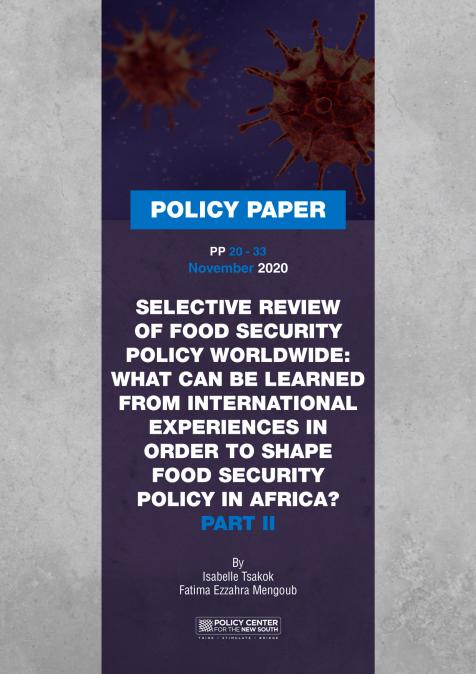Publications /
Policy Paper
Food security for all requires (i) sustained productivity growth and competitiveness, not only of agriculture but of the entire economy; (ii) a social safety net; and (iii) resilience in the face of periodic shocks. This is the central message of this review.
Two popular concepts in food security for all are food self-sufficiency (FSS) and food sovereignty (FSY). While countries have pursued different policies to achieve FSS, the common element in their approaches is the misguided belief that domestically producing all of a country’s consumption of basic food makes that country food secure. In addition, FSY is concerned with retaining control over policy; that is a country’s agri-food should not be subjugated to foreign corporate interests. Though popular, implementation of these concepts has not delivered “food security which exists when all people, at all times, have physical and economic access to sufficient safe and nutritious food that meets their dietary needs and food preferences for an active and healthy life”– (1996 World Food Summit). We label this holistic concept of food security: FSH. FSH rests on four pillars: availability, access, utilization, and stability. FSH in fact corresponds to the food security most people want. More often than not, achievement of FSS or FSY is not FSH. Instead, their implementation has raised serious questions regarding the sustainability, inclusiveness, and resilience1 of food systems.
If there were any a time to rebuild our agri-food systems, it is now in the dark days of the COVID-19 pandemic and strenuous socio-economic recovery efforts. The widespread dislocation of globally integrated agri-food value chains inflicted by the pandemic may lead policymakers to conclude that, contrary to experience, the higher the level of FSS, the more solid the guarantee of food security. Far from it. If the pandemic has taught us anything, it is that the countries that fared best are those where the leadership recognized the magnitude of the public health threat, and responded swiftly and decisively to detect, isolate, contact trace, treat, and contain the virus. They learned from their past experiences with contagious diseases, used science and technology, and enjoyed public trust throughout.
The same qualities of leadership and governance apply to achieving food security for all. The leaders that have done best have recognized that the food security
challenge requires transformation not only of their agricultures but of their entire economies as well. They put in place investments, incentives, and institutions that made use of science and technology, and improved access to expanding markets to fuel their decades-long transformations. They monitored the impacts of their interventions and adjusted their policies along the way.
Our review of food security policy in 16 countries (five in and 11 outside Africa) includes high, middle and low-income countries with very different historical legacies and structural characteristics, and at very different stages of development (see Annexes 2, 3 (a) and (b) and 4). This great diversity shows that countries whose leadership promoted sustained agricultural productivity growth in the earlier decades of their development within a macro and trade framework of expanding markets (domestic and foreign), succeeded best in achieving FSH. They recognized the complex short- and long-term challenges of achieving FSH and did not reduce them to only domestic production of more basic staples.
Herein lies a basic point for policymakers in developing countries with significant (5%-10% of GDP or more) agricultural sectors: invest, invest, invest in your agrifood sector and not only for food staples but also to increase value added at primary and processing levels, to diversify and to integrate into the broader macro and world economy. Too many developing countries have followed industry-first import-substituting strategies. Like China under Mao (although they did not share the same ideology), many countries wanted to ‘leap’ into industry and ‘squeeze’ agriculture. Largely as a result, they have neither a strong industrial sector nor a strong agricultural sector. Timmer (2015) put it best: “No country has succeeded in its industrial revolution without a prior (or at least a simultaneous) agricultural revolution. Neglecting agriculture in the early stages of development is neglecting development”. Worldwide experience amply shows that it is essential not only to promote agriculture but to transform it; not just to increase output but to sustain its productivity growth, transforming it into a diversified and high value added sector that progressively integrates into the broader domestic and world economy.
To achieve FSH, an agricultural revolution is necessary but not sufficient. Persistent poverty in many Asian countries that have successfully promoted the Green Revolution illustrates this. A social safety net is required even in high-income countries, for everyone is vulnerable to economic downturns, personal misfortunes, and periodic disasters. Just as individuals need insurance, so do societies as a whole for resilience and longevity. Unless an economy is resilient, successful agricultural and economic transformation is virtually impossible, because transformation is ‘slow magic’ that stretches over several decades at least. For any country during this long period, the likelihood of being plunged into a crisis beyond its control is very high. The COVID-19 pandemic is an example.
The COVID-19 pandemic has laid bare one key food security vulnerability: weaknesses in public health systems. Public health systems at all levels —from local to global —are being severely tested. It is increasingly clear that global public health is an essential public good for food security. Our highly integrated global economy, our warming climate, and high rates of urbanization are key structural features that heighten our vulnerability to the rapid spread of infectious diseases. Snowden (2019) argued that the old wisdom that saved societies in the past must be
brought front and center of government: “salus populi, suprema les esto” according to the ancients (Adams, 2020). In other words, public health must be the highest law. All else follows from it. Therefore, in a post-pandemic era, governments must invest in strengthening their public health infrastructures to achieve domestic food security, and should do so with global partners.
In rebuilding their economies after the COVID-19 pandemic, African leaders should not forget this centuries-old lesson regarding the fundamental importance of public health as they prioritize continental trade. Such trade can rightly be viewed as the prime mover in the agricultural and economic transformation of the continent, necessary to eliminate extreme poverty, and achieve food security for all in Africa. The Africa Continental Free Trade Area (AfCFTA) promises to be a vast continental market of increasing agri-food demand from an urbanizing and industrializing Africa. Realizing this great potential will require African leaders committed to a vision of an integrated, peaceful, and prosperous Africa that is capable of drawing on the substantial assets Africa has, including regional and global alliances, a diaspora of well trained and well financed Africans, and institutions of agricultural research, development and higher learning. Leaders should also be fully aware of the pitfalls and promises in global experiences of food security policy.









